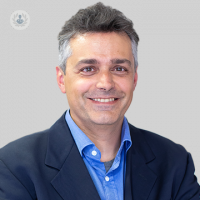Congenital heart disease (CHD): Can my child have a normal life?
Written in association with:Naturally, parents of a child with congenital heart disease (CHD) will be worried about the quality of their child’s life. Dr Alessandro Giardini is a leading London-based paediatric cardiologist who has spent over 20 years helping children with CHD. He clarifies what parents can expect regarding the likelihood of surgery, the quality of life and life expectancy of children with CHD and if they’ll be vulnerable to other conditions.

What are the most common congenital heart diseases in babies and children (CHD)?
The most common congenital heart diseases (CHD) in children are holes in the heart, which can be at different levels and have different consequences for children.
They can be born with valves which don’t work normally, such as the bicuspid aortic valve. Aside from this, there are less frequent cardiac defects children can be born with - the majority being more complex and can be picked up antenatally (before birth).
After a diagnosis of congenital heart disease, is surgery necessary?
The majority of congenital heart defects, fortunately, will not require treatment. If treatment is surgical treatment is required, keyhole surgery will be the first option as it is safer for the child than open surgery. Nowadays, we can offer a surgical option for all types of congenital heart disease and very few are inoperable.
Can CHD be cured?
Yes. As previously mentioned, the majority of children don’t require treatment, but when treatment is necessary, the great majority can be fully cured.
Will all children with CHD reach adulthood? Is there a life expectancy?
In only a very small number of congenital heart conditions will the quality of life not be normal.
Life expectancy is deemed to be normal or near-normal for a great majority of children, whether their condition needed treatment or could be left untreated. There is a small group of conditions where life expectancy will not be normal. However, it’s important to remember that the great majority will reach adulthood and will have a normal life expectancy, normal ability to work, normal social life and be able to perform activities like sports.
What treatment is available?
While the majority of CHD patients will not require treatment, there will be ongoing monitoring – essentially waiting until nature fixes the problem itself – which is very often the case.
In some children, there might be a need for intervention, which can be in the form of keyhole surgery (non-invasive) or open-heart surgery. Some children may require medication until they have surgery or even after surgery. In the majority of children who have had an operation for their CHD, follow-ups of appointments and sometimes medication will be required for a number of years, and some for all their life.
Does CHD make children more prone to other conditions throughout life?
What’s important is that CHD can be associated with other genetic defects, and generally, that is the reason for extra cardiac problems. Sometimes, children with syndromes have problems that step from the syndrome rather than directly to the heart, such as Down’s syndrome, DiGeorge syndrome and Turner’s syndrome.
Dr Giardini is available to help at several renowned medical institutions in London, including the Great Ormond Street Hospital. Click here to learn how he can help you and your child, and to book an online or face-to-face appointment.


